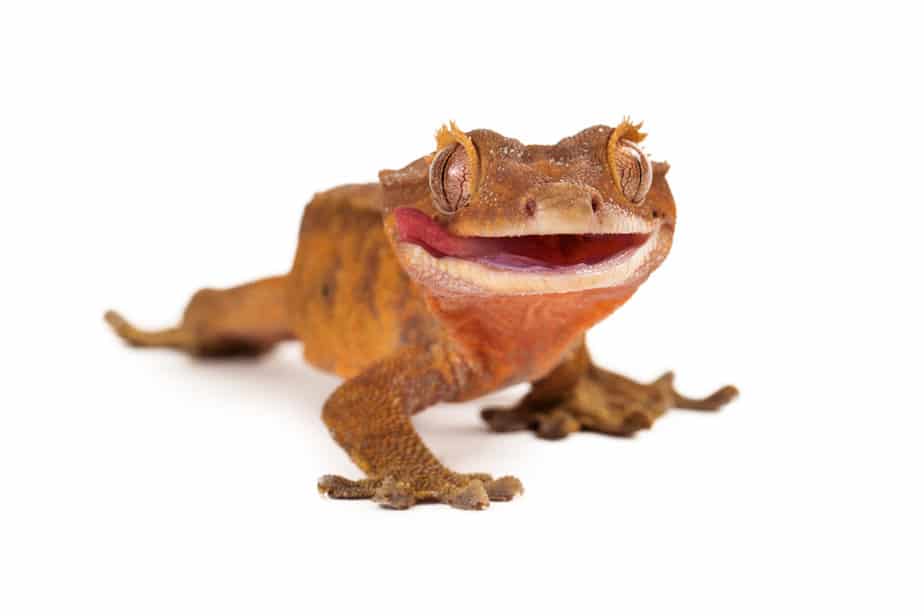Crested geckos have 177 teeth. Crested Geckos are born with these teeth and regrow them every few months. However, the teeth are very small and are difficult to see.

What do crested geckos’ teeth look like?
Crested geckos are born with tiny, fully-grown teeth that aren’t that sharp. They are located on both the upper and lower jaw. The main reason it’s difficult for you to see them is their size.
It also doesn’t help that crested geckos don’t use these teeth to chew. As such, you won’t notice their teeth until you peer into their open mouths.
Do crested geckos bite?
While it’s rare, crested geckos can bite. They usually do this when they feel threatened. Some of the situations that can make them feel this way and want to bite you include:
- When they are being overhandled, especially when they’re in a new environment or with a new owner
- When their tank is open, and they feel overexposed
- When they’re too young to know that your finger isn’t food
- When they’re gravid
- When they’re underfed
- When they’re having health issues
- When they’re being territorial and fighting with tank mates or are jealous because they can smell another gecko’s scent on your hand
Keep in mind though – crested gecko bites don’t hurt or cause any harm. Their teeth are too small and weak to break your skin.
After all, these teeth can’t even help them chew food. As such, crested geckos will usually rely on their jaw bones and sticky tongues to catch and swallow their prey whole.
Can you tell when your crested gecko is about to bite you?
Some of the signs that your crested gecko wants to bite you include:
- It starts twitching, opening its mouth, and moving its tail – this is a sign that it’s angry, stressed, or both
- It squeaks, clicks, barks, or chirps while charging toward you
- It jumps around when you try to feed or touch it
- It watches all of your moves and can’t take its eyes off your fingers
- It eats more or less than usual
What can you do to prevent crested gecko bites?
If your crested gecko has bitten you, here are a few things you can do to keep this from happening again:
- Wear gloves before handling a crested gecko or any other animal
- Avoid touching the reptile’s snout and mouth.
- Provide the reptile with a nutritious diet
- Give the crested gecko at least two weeks to settle down if you just brought it home or moved it to another location. Don’t try to handle it during this period.
- When you resume handling your crested gecko, only do it for durations of 4 to 5 minutes.
- Try to handle your crested gecko no more than once a week.
- Lean towards handling the gecko during the day rather than at night. They are least active during the day and are less likely to put up a fight.
- When you start handling a new crested gecko, take things slow.
- Aim to replace water and food in the late afternoon
- Introduce hand walking – allow them to walk or run from one of your hands to the other. However, this taming approach requires patience. It can take up to a month for it to make your gecko more comfortable around you.
What should you do when your crested gecko bites you?
When your crested gecko bites you, you should immediately remove your hand from the tank and go wash it.
This is especially important if you have any open wounds on your hand and didn’t wear gloves before handling your reptile.
While a crested gecko’s bite won’t do any harm to your skin, it can introduce germs to an open wound.
So if you suspect that this has happened, you need to go see a doctor.
Once you’ve done this, you can then go to see if your crested gecko hurt itself when biting you.
Remember, a crested gecko’s teeth are weak and can easily get injured in the process of biting. If you notice that this has happened to your gecko, take them to the vet to get their teeth and gums checked.
Final thoughts
While crested geckos are one of the few geckos that have teeth, they can’t do much harm with them. As long as you keep your reptile healthy, happy, and stress-free, they’re unlikely to ever bite you. And even if they do, you probably won’t feel anything or become sick.
